GUMC Stories
Following a Tradition of Dedication and Service to the U.S. Military
May 19th, 2019
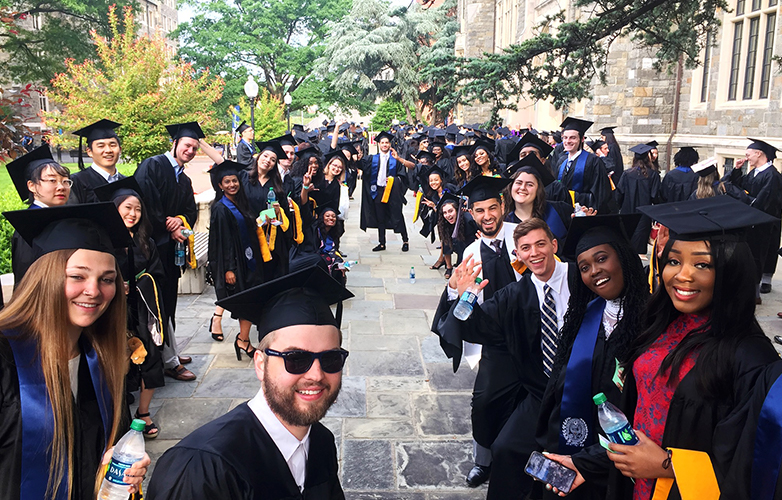
Posted in GUMC Stories | Tagged BGE Commencement 2019, Biomedical Graduate Education, biomedical research
(May 19, 2019) — More than 550 students graduated from Biomedical Graduate Education (BGE) certificate, master’s and PhD programs over this past year, with many returning to the Hilltop to attend the Graduate School of Arts & Sciences commencement ceremony on May 17.
Georgetown University Medical Center’s BGE supports the over 35 biomedical programs by recruiting top students and facilitating a comprehensive educational experience. It strives to provide each student with the tools and resources they need post-graduation.
“Congratulations to our BGE graduates!” said Barbara Bayer, PhD, senior associate dean of BGE. “May your new scientific expertise and Georgetown values guide you through your professional journeys.”
Among this year’s graduates are students with varying stories and backgrounds, but a comparable love of learning and passion for science. As their journeys after graduation begin, they provided reflections on their time at Georgetown.
Rushil Mehta (G’19) comes from a family of dentists and physicians. He plans to merge his interests in the two fields by becoming an oral and maxillofacial surgeon.
To do this, Mehta knew he needed additional training before applying to dental school, which for aspiring oral surgeons is followed by a surgery-based residency program.
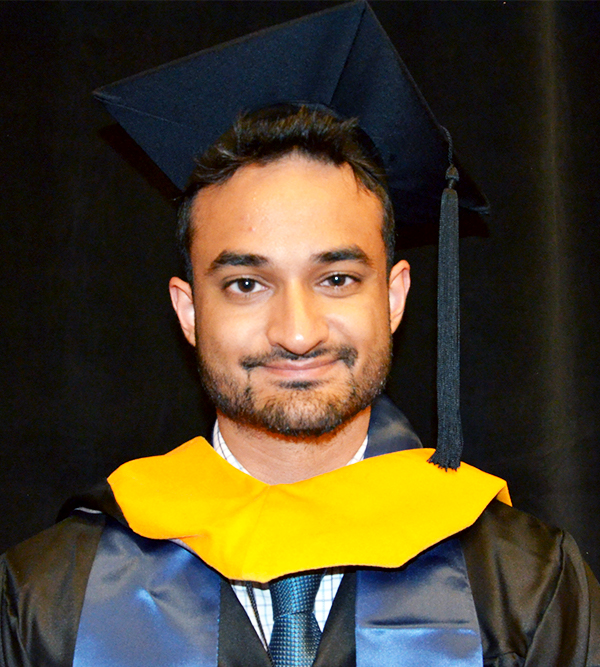
After graduating from the University of Pittsburgh, he began exploring his options. “I was talking to the program coordinator for the master’s in physiology at the time,” Mehta said. “I asked her what percentage of students who complete the program get accepted into medical or dental school and she said 80 percent, which sold me right away.”
Understanding physiology, Mehta explained, is extremely important for oral surgeons. During the fall 2018 semester, Mehta took a five-credit course in human physiology, which covered the main organ systems in the body.
“It was by far one of the toughest courses I’ve ever taken in my academic career,” he said.
Because of his hard work and the program’s strong curriculum, Mehta was accepted into a four-year doctor of dental surgery program at the University of Maryland School of Dentistry, where he will begin coursework in fall 2019.
He credits Jennifer Whitney, PhD, the MS in physiology program director and associate professor in the department of pharmacology and physiology, and Thomas Sherman, PhD, a professor in the department of pharmacology and physiology, for his success in the program and ultimate acceptance into dental school.
“They were great professors and they always answered all the questions that I had,” he said.
Acquiring funding for research can be challenging for anyone. So when tumor biology PhD graduate Deanna Tiek (G’19) received an award that would pay for up to two years of her doctoral program and four years of a postdoctoral fellowship, it relieved a great deal of pressure.
The National Cancer Institute (NCI) F99/K00 Transition Award is awarded to about 20 students nationwide — all of them nominated by their institution.
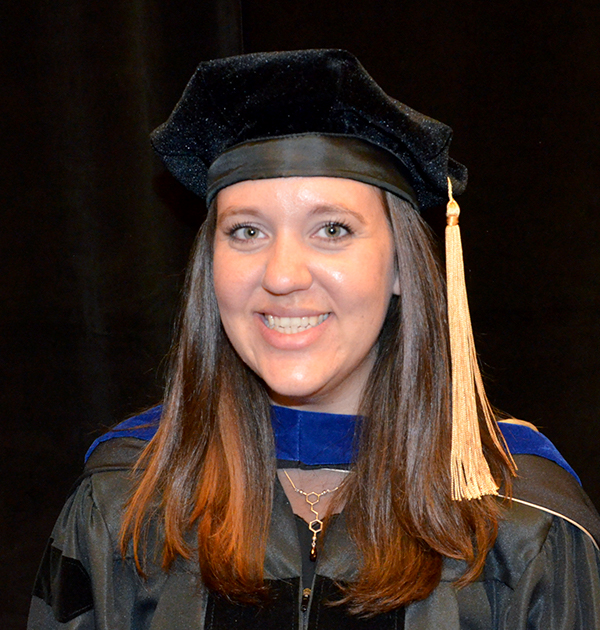
Tiek will soon begin a postdoctoral fellowship in the lab of Shi-Yuan Cheng, PhD, at the Robert H. Lurie Comprehensive Cancer Center of Northwestern University. Her doctoral research focused on glioblastoma (GBM), a drug-resistant form of brain cancer, emphasizing the resistant phenotype.
“It has a pretty poor overall survival rate, and then once patients become resistant to the drug, since there’s only one FDA-approved first-line therapy, they usually only have about six to eight months to live,” said Tiek.
One of the daunting parts of entering a PhD program, admitted Tiek, is that you’re asked to discover something new — something no one has ever discovered before — and do it in roughly five years.
But working with Rebecca Riggins, PhD, associate professor of oncology at Georgetown Lombardi Comprehensive Cancer Center, made the creative process much more enjoyable.
“Her lab mostly focuses on breast cancer research, which is what I started out in,” Tiek said. “But then I became really interested in brain cancer research after a few different rotations and a lot of reading.”
“When I mentioned to her that I wanted to do GBM, maybe instead of breast cancer, she was really supportive the whole time,” Tiek added. “She even started reading her own GBM literature.”
When Michael Corrado (G’19) applied to the MS in biochemistry and molecular biology, he didn’t know about the DMV Hoyas Biomedical Academic Scholarship, a merit scholarship designed to attract exceptional students from colleges and universities in DC, Maryland and Virginia.
As a high-performing student at DC’s American University, he was invited to submit a separate application for the scholarship, which he was later awarded.
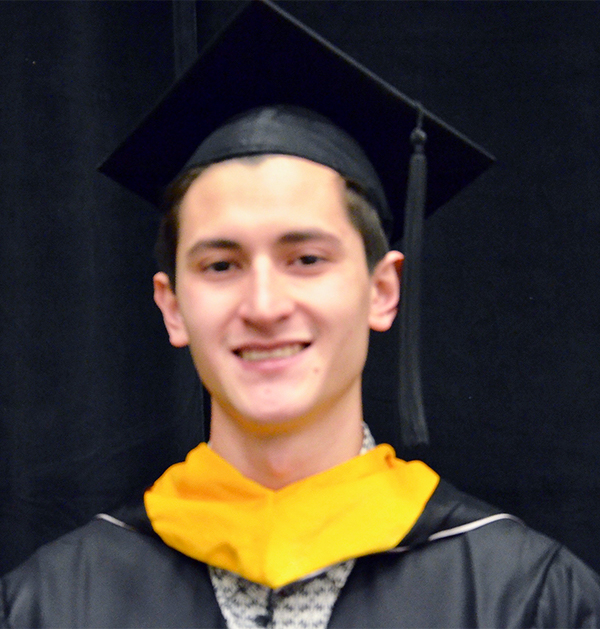
“It was the deciding factor, honestly,” Corrado said. “It was such a huge weight lifted off my shoulders. I’m so thankful that Georgetown took the initiative and reached out to me about the scholarship when I applied. I think that says a lot about the school as a whole.”
The lighter financial burden provided by the scholarship enabled Corrado to focus on learning from, and collaborating with, his professors and classmates.
From the beginning of the program, Corrado really enjoyed his coursework, including a seminar in biohazardous threat agents and emerging infectious diseases, where students had the opportunity to connect over Skype with an expert from Lawrence Livermore National Laboratory.
In a course on the molecular basis of carcinogenesis, Corrado learned more about cancer from Usha Kasid, PhD, professor of radiation medicine and biochemistry and molecular and cellular biology.
“She did a great job of breaking it down into these little subsections for us and bringing in different speakers for each section. It was really an interesting class,” he said. “I was overall quite impressed with the caliber of faculty in my program.”
Corrado is exploring many options for his next move, including working in the Rockville, Md., area, a hub of biotechnology and pharmaceutical companies.
After studying at Southern Medical University in China, one of several BGE international partnership institutions, biostatistics graduate Jiachen Lu (G’19) arrived in the U.S. in 2017.
The partnership provides a direct pipeline for students like Lu to study at Georgetown. As one of China’s top universities, Southern Medical University’s collaboration with BGE includes faculty exchange, research collaborations and partial tuition scholarships.
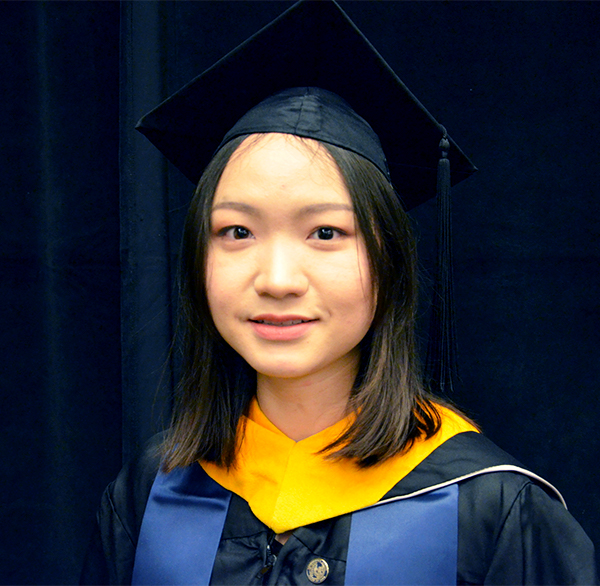
Lu felt well-prepared for Georgetown, having studied biostatistics in her undergraduate program. However, like many international students, adjusting to a new culture can be intimidating.
“Finding housing, using transportation and shopping were all strange at first,” she said. Over time, Lu became more comfortable, made friends and embraced aspects of Chinese culture in the local community, including by visiting a Chinese supermarket in Virginia.
She also immersed herself in the biostatistics program, eventually helping design a real phase 1 clinical trial at the Georgetown Lombardi Comprehensive Cancer Center for her master’s thesis. “The guidance and support I received from my professor on this project, Dr. Hongkun Wang, was so immeasurable,” Lu said.
Her commitment to biostatistics led to an internship with Georgetown Lombardi’s Office of Minority of Health and Health Disparities Research, where she worked in summer 2018 and through the fall 2018 semester.
“At first, I wasn’t familiar with the disparities black women face in the U.S.,” she said. “But Dr. Adams-Campbell and Dr. Dash really helped me understand those issues deeper, beyond the statistics I was doing.”
Lu completed her coursework in fall 2018 and started working permanently there as a biostatistician in January 2019, work she has enjoyed immensely.
Seren Snow
GUMC Communications
GUMC Stories
Warwick Evans Celebrates Student Achievements in Academics, Service and Leadership
May 19th, 2019
GUMC Stories
NHS Commencement Speaker Encourages Graduates to Embrace a Values-Based Life
May 18th, 2019